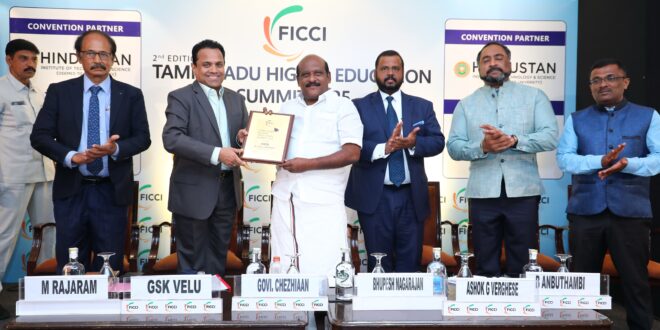Chennai: The much acclaimed Tamil Nadu Higher Education Summit 2025 organised by the major industry body FICCI opened on a promising note in Chennai on Wednesday with Dr. Govi Chezhiaan, Minister for Higher Education, Government of Tamil Nadu, making a clarion call for taking higher education standards to the next level based on the avowed concepts of an established system in the country over the years.
While heartily welcoming the academic leaders, Industry partners, and friends, the Minister lauded FICCI for conducting the Tamil Nadu Higher Education Summit 2025, which is timely in so many ways even as the academic bodies and universities in the state are enjoying better freedom now more than ever in the past.
The summit has brought together thought leaders from academia and industry to chart the future of higher education in the state, the Minister said adding the discussions around artificial intelligence, lifelong learning, and industry-aligned university ecosystems reflect our collective aspiration to transform Tamil Nadu into a global hub for knowledge and innovation.
Tamil Nadu has long held a distinguished place in India’s higher education landscape. As one of the leading contributors to India’s knowledge economy, our state continues to set benchmarks in access, quality, and equity, he noted.According to the Performance Grading Index (PGI) 2023 released by the Ministry of Education, Tamil Nadu has secured one of the highest scores, reflecting our strong performance in governance, access, and learning outcomes.
“We are also proud that Tamil Nadu’s Gross Enrollment Ratio in higher education stands at over 51%, far surpassing the national average of around 28%. This clearly demonstrates the state’s emphasis on inclusive and accessible tertiary education. With a literacy rate of 82.9%, and commendable female literacy figures, we are steadily moving towards our vision of universal education and skill development, the Minister said.
He further said: “Our robust higher education ecosystem is further strengthened by the active participation of the private sector, which includes a large number of affiliated colleges, deemed universities, and research institutions. Tamil Nadu is a leading state in technical education, producing a significant portion of the country’s engineering graduates. This focus on professional and technical education has made our state a preferred destination for talent in fast-growing sectors like IT, biotechnology, and electronics. The benefit should go to students from poor and marginalised sections of society.
“At the same time, we are fully cognizant of the rapid technological changes transforming the global economy, particularly the rise of artificial intelligence. Tamil Nadu has taken progressive steps to prepare for the AI-driven future,” he said with a sense of confidence.
He said the credit should go to Chief Minister of Tamil Nadu Mr M K Stalin for creating the ecosystem for higher education in the state thereby halting the migration of students to the Northern states.
He said a meeting of all vice chancellors of universities is scheduled in the evening at the Secretariat by the Chief Minister to discuss matters relating to academic freedom.Institutions like IIT Madras, with their Robert Bosch Centre for Data Science and AI, are leading the way in cutting-edge research and innovation. Our government has also taken proactive measures through initiatives such as the Tamil Nadu Artificial Intelligence Mission (TNAIM), which supports curriculum development, faculty training, industry partnerships, and the setting up of AI labs across engineering colleges.
“We have also introduced AI and data science courses at both undergraduate and postgraduate levels and integrated AI-related subjects in school curricula—signalling a holistic, long-term approach to AI readiness. In partnership with platforms like NASSCOM, we are investing in skilling programs that address the talent gap in emerging technologies,’ the Minister remarked.
“There is an urgent need to ensure that AI education is not limited to elite institutions alone. We must empower tier-2 and tier-3 colleges, particularly in rural areas, with the infrastructure, faculty, and digital tools required to deliver high-quality AI education. More interdisciplinary research involving ethics, humanities, and social sciences must also be encouraged to guide the responsible and inclusive use of these technologies, he concluded.
In his presidential address, Dr. GSK Velu, Chairman, FICCI Tamil Nadu State Council, said the summit marks a significant step in FICCI’s ongoing efforts to foster dialogue and
partnerships that can transform the higher education ecosystem in Tamil Nadu.
“As we stand at the intersection of rapid technological change and a globalized economy, it is critical that we reimagine our higher education framework to build a truly future-ready Tamil Nadu,” he said.
Today’s panel discussions brought forth compelling insights on two key areas—leveraging artificial intelligence to enhance the teaching and learning experience, and aligning university education with the rapidly evolving needs of the industry. The digital revolution has altered the very fabric of education. AI and data-driven technologies offer immense potential for personalized learning, predictive analytics, and intelligent content delivery. But to harness this effectively, we must build the necessary digital infrastructure and empower our educators with relevant training, he noted.
He wanted Tamil Nadu to have at least 10 globally ranked institutions in the next decade. Institutions that are known for world-class research, global partnerships, innovation hubs, and entrepreneurial talent. To do this, we must invest in global collaborations, faculty exchanges, interdisciplinary research, start-up incubation, and infrastructure that supports creativity and experimentation.
He also stressed equity and inclusion too to make institutions serve students from all
backgrounds—urban and rural, privileged and underprivileged. The digital divide must be bridged, and more support should be extended to first-generation learners and women in higher education.
“I urge all stakeholders here—government, universities, industry, and civil society—to work together with FICCI to co-create this future. Let us form working groups, task forces, and pilot projects that focus on solving real challenges. Let us build a higher education model that is not only globally competitive but also locally rooted and socially responsible,’ he remarked.
Educationist Dr Ashok G Verghese said that Tamil Nadu is a leader in educational aspects with innovative ideas emerging from universities and other academic bodies, more so with the industries and institutions collaborating with lots of investments on that count.
Stressing on the talent pool creation with proper training to youngsters by the industries, he said areas like aviation and others have the scope to grow, all with the concept of `Make in India’ of the Union government.
He wanted to build a future ready workforce with a lifelong learning with a proper educational ecosystem since there is challenge ahead in the new world order.
“AI is redefining the future of technology and we have to keep ready to base our higher education in tune with the emerging technologies,” he said.
Dr M Rajaram, a retired IAS officer, said that the summit will have wide ranging discussions on higher education for the benefit of one and all attending it and more so to prepare the students for the future.
Lauding FICCI for holding the higher education summit, he said, “We have to compete with the global standards in education as the country has all the resources on that count.”
Mr Bhupesh Nagarajan, Co-Chairman, FICCI Tamil Nadu State Council, in his introductory remarks outlined the need and scope for conducting the higher education summit by the industry body with a view to sharing ideas on various concepts of education from educationists and intellectuals for the overall benefit of participants.
The summit also saw panel discussions on Future Forward-Exploring AI’s Role in Revolutionising Higher Education and Lifelong Learning and Building a Future-Ready Workforce through Industry-aligned University Learning Ecosystems.
There was also a parallel session on Building Global Brands of Higher Education in Tamil Nadu-Opportunities and Challenges.
 Expressnews
Expressnews







